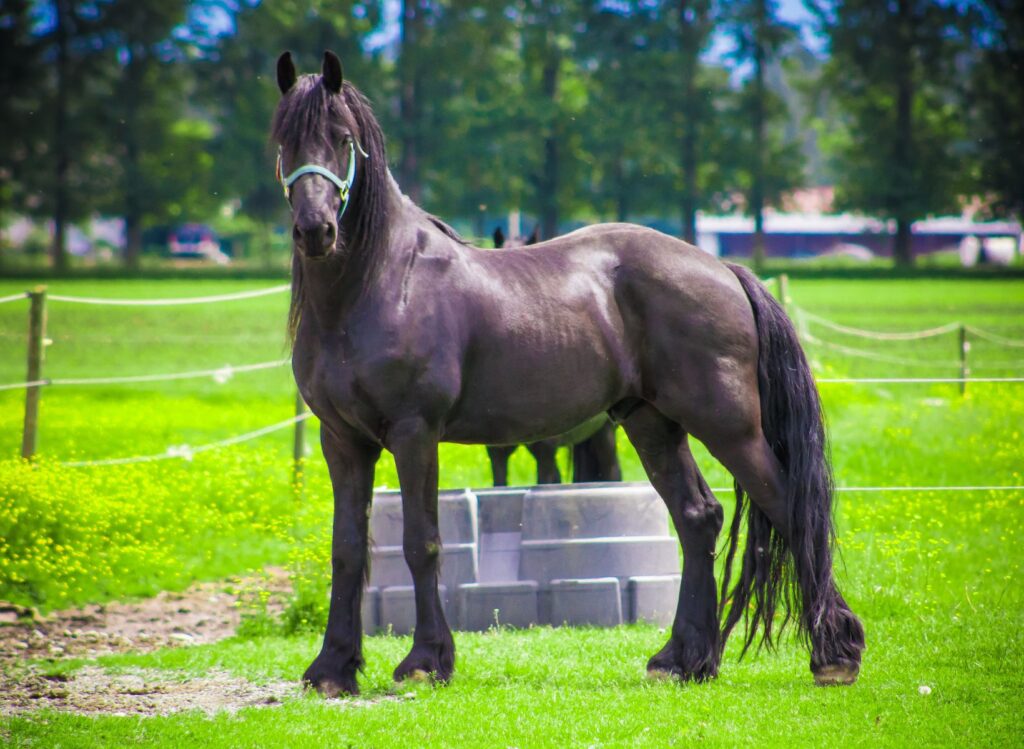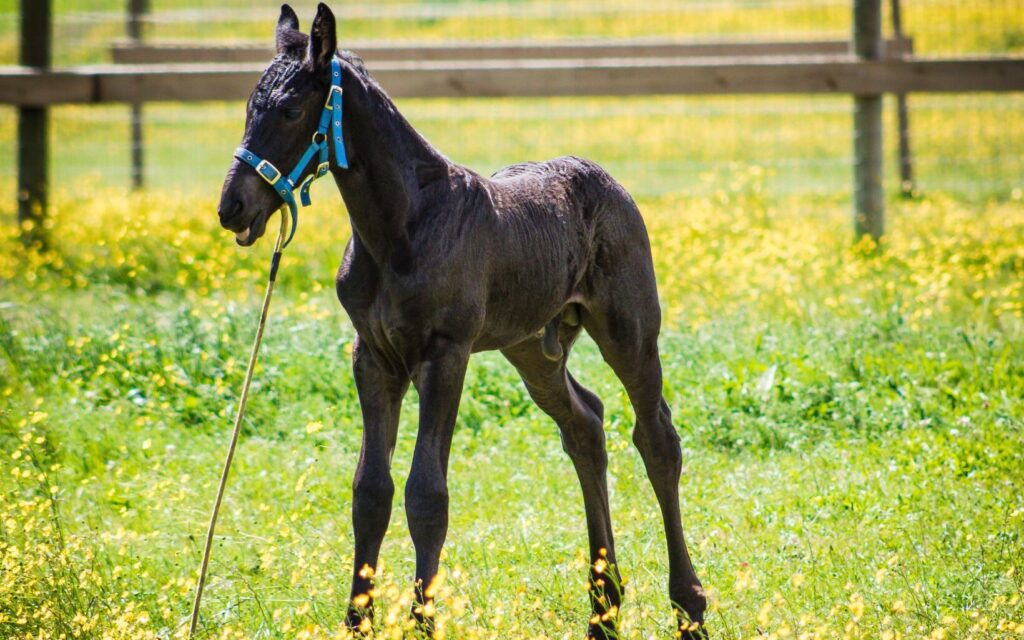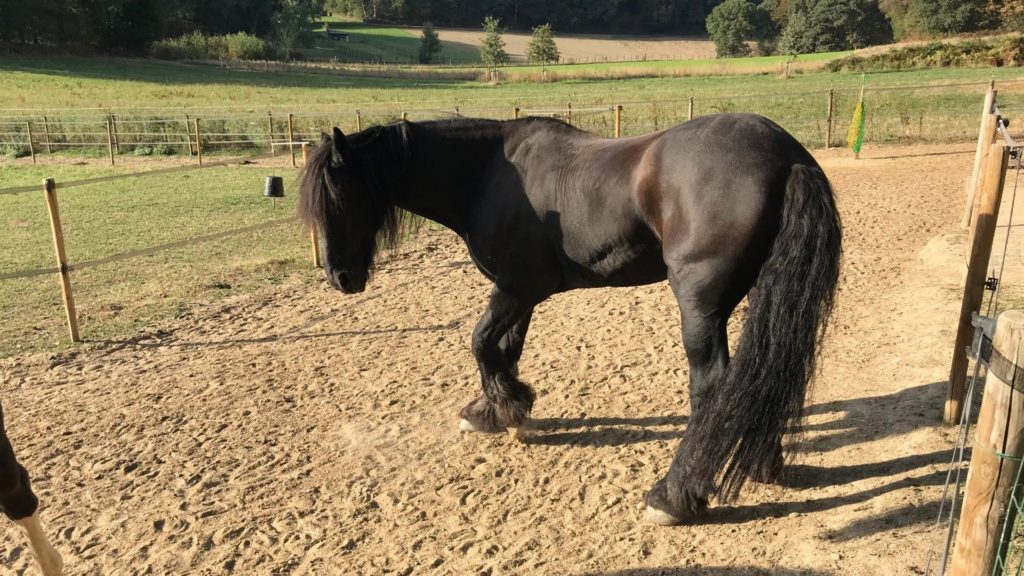Published on: November 28, 2024
Friesian horses captivate us with their flowing manes, graceful movement, and unmistakable elegance. As an owner, I remember the thrill of seeing my first Friesian—it was love at first sight. Yet, as beautiful as they are, Friesians come with unique challenges, including their predisposition to genetic conditions due to a limited gene pool. Understanding these conditions and how to manage them is key to ensuring these magnificent horses live long, healthy lives.
In this guide, we’ll explore common genetic conditions in Friesians, the importance of genetic testing, responsible breeding practices, and care strategies for affected horses.

Genetic Disorders in Friesians: Key Conditions to Know
Friesians are predisposed to several notable genetic disorders, which can be challenging for owners to manage. However, understanding these conditions and implementing proactive care can make a significant difference. Let’s explore these conditions and how you can support your Friesian.
Hydrocephalus in Friesians: Symptoms and Prevention
The first time I heard about hydrocephalus in Friesians was from a breeder who shared their heart-wrenching experience of losing a foal to this condition. Hydrocephalus occurs when cerebrospinal fluid accumulates in the brain, causing an enlarged skull and severe neurological problems. Tragically, foals with this condition often don’t survive, making prevention through genetic testing essential.
- Symptoms: Enlarged head, difficulty nursing or standing, and other neurological abnormalities.
- Causes: This condition is caused by a recessive gene, often linked to inbreeding.
- Management: There is no cure. Ultrasounds in pregnant mares can help detect the condition early. While some affected foals may receive temporary supportive care, euthanasia is often the most humane option.
- Prevention: Genetic testing is critical to avoid breeding two carriers of the hydrocephalus gene.
Learn more about equine genetic testing from UC Davis Veterinary Genetics Laboratory.
Interesting Fact: The mutation responsible for hydrocephalus in Friesians is linked to a specific recessive gene, highlighting the importance of genetic testing. Read more about hydrocephalus in Friesian horses here.
Managing Aortic Rupture in Friesian Horses
A fellow Friesian owner once recounted their devastating experience when a seemingly healthy horse collapsed during light exercise. The cause? Aortic rupture. This sudden, often fatal condition involves a tear in the aorta, the artery that carries blood from the heart. While rare, it underscores the importance of monitoring cardiovascular health, particularly in Friesians with a genetic predisposition.
- Symptoms: Sudden collapse, difficulty breathing, and pale gums. Unfortunately, there are often no warning signs.
- Causes: Weak arterial walls due to genetic factors.
- Management: Sadly, this condition is usually fatal. To reduce risks:
- Avoid strenuous activities in horses with known predispositions.
- Schedule regular veterinary evaluations, including cardiac checks.
- Prevention: Breeders should avoid mating horses from lines with a history of aortic rupture.
See more about aortic rupture in Friesians here.

Dwarfism in Friesians: Causes and Care
I once met a Friesian owner who had a horse affected by dwarfism. Despite its challenges, the owner spoke warmly about how they adapted their care routine to support their horse. Dwarfism results in disproportionately small Friesians with joint and limb abnormalities, requiring attentive care and creative solutions.
- What It Is: A genetic disorder that leads to shortened limbs, large heads, and joint issues.
- Symptoms: Shortened limbs, abnormal hoof growth, and limited mobility.
- Causes: Caused by a recessive gene; both parents must carry the gene for a foal to be affected.
- Management:
- Joint supplements and therapies can improve mobility.
- Proper hoof trimming helps reduce stress on malformed joints.
- Owners often modify stable layouts to accommodate smaller horses and adjust exercise routines to avoid joint strain.
- Prevention: Genetic testing helps identify carriers and prevents pairing two carriers.
Understanding Megaesophagus in Friesian Horses
A Friesian with megaesophagus can present unique challenges for its owner. One owner shared how feeding small, elevated meals and monitoring closely for regurgitation became a part of their daily routine to keep their horse comfortable. Megaesophagus causes the esophagus to enlarge, making it difficult for food to pass to the stomach.
- What It Is: An enlargement of the esophagus that impairs swallowing and digestion.
- Symptoms: Difficulty swallowing, regurgitation, weight loss, and susceptibility to aspiration pneumonia.
- Causes: Likely hereditary, though the exact genetic basis is not fully understood.
- Management:
- Feed smaller, frequent meals from an elevated position.
- Work with a veterinarian to monitor for complications, such as pneumonia.
- Use softer feeds to minimize strain on the esophagus.
- Additional Resource: Learn more about megaesophagus in Friesians.

The Importance of Genetic Testing for Friesians
Genetic testing is invaluable for Friesian owners and breeders, enabling informed decisions to protect the breed’s health. Testing can:
- Identify Carriers: Detect recessive genes linked to conditions like hydrocephalus or dwarfism.
- Guide Breeding Decisions: Prevent pairing two carriers, which drastically reduces the chance of producing affected foals.
- Promote Genetic Diversity: Test results help avoid breeding close relatives, decreasing the risk of inbreeding.
Resource: A Primer on Genetic Testing for Horse Owners and Breeders is a resource for owners and breeder to learn about intracacies of genetic testing so they can make informed decisions.

Responsible Breeding Practices for Healthy Friesians
Preserving the health of Friesians begins with ethical and informed breeding practices. These strategies can help reduce the risk of genetic disorders:
- Avoid Inbreeding: Friesians’ small gene pool increases the likelihood of genetic disorders. Breeders should prioritize outcrossing to introduce genetic diversity.
- Select Healthy Stock: Choose stallions and mares with clean genetic health profiles and sound conformation.
Success Story: Avoiding Genetic Issues Through Testing
One Friesian breeder shared with me how genetic testing transformed their program. After discovering their prize mare carried the recessive gene for hydrocephalus, they avoided mating her with another carrier. Instead, they selected a stallion with a clean genetic profile.
The result? Three healthy foals born over five years with no signs of genetic disorders. The breeder credits testing and careful planning for their success, proving how proactive decisions can safeguard both the health of individual horses and the breed’s future.
- Follow Registry Guidelines: Organizations like the Royal Friesian Horse Studbook (KFPS) promote responsible breeding and track genetic health trends within the breed.
- Collaborate with Veterinarians: Work closely with vets experienced in Friesian health to develop breeding strategies that minimize risks.

Caring for Friesians with Genetic Disorders
Managing a Friesian with a genetic condition requires commitment and a proactive approach. Partnering with equine professionals ensures your horse gets the care they need to thrive. Below are general care strategies and condition-specific tips to help you navigate these challenges.
General Care Strategies
- Frequent Monitoring: Regular grooming and veterinary check-ups allow for early detection of any changes in your horse’s health and enable prompt intervention.
- Supportive Diet: Tailor your Friesian’s diet to their specific needs, incorporating supplements that promote joint health, reduce inflammation, and boost overall wellness.
- Tailored Exercise: Adjust exercise routines to minimize strain on affected joints or cardiovascular systems. Gentle, low-impact activities are often best for Friesians with health challenges.
Supportive Diet for Friesians with Genetic Conditions
Diet plays a crucial role in managing genetic conditions. Here are some specific dietary elements and their benefits:
- Omega-3 Fatty Acids: Found in flaxseed or fish oil, omega-3s help reduce inflammation, support joint health, and promote cardiovascular wellness, especially for horses at risk of aortic rupture.
- Suggested Supplement: Flaxseed meal or Equine Omega Complete for an equine-specific formula.
- Glucosamine and Chondroitin: These supplements support cartilage repair and joint health, particularly for Friesians with dwarfism or other skeletal issues.
- Benefit: Enhances mobility and reduces joint discomfort.
- Vitamin E and Selenium: Antioxidants that support muscle function and reduce oxidative stress. They are especially useful for Friesians with neurological conditions like hydrocephalus.
- Caution: Selenium toxicity is a risk, so consult your veterinarian for dosage recommendations.
- Probiotics and Prebiotics: These supplements improve gut health, which is particularly important for Friesians with megaesophagus or digestive sensitivities.
- Suggested Supplement: Choose an equine probiotic designed for digestive support and nutrient absorption.
- Electrolytes: Help maintain hydration and electrolyte balance, which is critical for horses prone to aortic rupture or those under stress.
- Usage Tip: Provide free-choice salt blocks and electrolyte solutions during warm weather or after exercise.
- Customized Feeds: Work with an equine nutritionist to create a feed program that addresses your horse’s specific genetic condition. For example, horses with megaesophagus benefit from softer feeds that are easier to swallow and digest.
Takeaway
Providing a diet rich in supportive nutrients not only improves your Friesian’s quality of life but also helps manage symptoms of genetic conditions. Always consult your veterinarian or a qualified equine nutritionist to design a personalized feeding plan tailored to your horse’s unique needs.
Condition-Specific Care for Friesian Horses
- Hydrocephalus: This severe neurological condition often requires euthanasia due to its life-limiting effects. Consult with your veterinarian for options based on the foal’s prognosis.
- Dwarfism: Provide joint care through therapies and regular hoof trimming to reduce stress on malformed joints. Learn more about managing Friesian Dwarfism.
- Megaesophagus: Feed smaller, frequent meals from an elevated position to prevent regurgitation and aspiration pneumonia.
- Aortic Rupture: Though often sudden and fatal, maintaining overall cardiovascular health and minimizing stress are essential preventative measures.
By integrating these strategies, you can improve your Friesian’s quality of life and proactively manage their genetic challenges.

FAQs About Genetic Health in Friesian Horses
If you’re looking for quick answers to common questions about genetic conditions in Friesians and how to manage them, we’ve compiled this helpful FAQ section for easy reference.
What are the most common genetic conditions in Friesians?
Friesians are susceptible to hydrocephalus, aortic rupture, dwarfism, and megaesophagus due to their limited genetic diversity.
How can genetic disorders in Friesians be prevented?
Genetic testing and responsible breeding practices, such as avoiding inbreeding, help reduce the likelihood of genetic conditions.
Are there treatments for Friesians with genetic conditions?
While cures may not exist, supportive care like tailored diets, joint supplements, and modified exercise can enhance their quality of life.
What supplements are beneficial for Friesians with joint or genetic issues?
Omega-3 fatty acids, glucosamine, and chondroitin support joint health and reduce inflammation in affected horses
How can I find out if my Friesian is a carrier of a genetic condition?
Genetic testing through labs like UC Davis Veterinary Genetics Laboratory identifies carriers and informs breeding decisions.

Conclusion: Ensuring the Health and Future of Friesians
Friesian horses inspire admiration for their beauty and grace, but their genetic challenges require proactive management. By embracing genetic testing, adhering to responsible breeding practices, and providing attentive care, you can help your Friesian thrive while preserving the breed’s legacy for future generations.
If you’re a Friesian owner or breeder, we’d love to hear your experiences and tips in the comments below. Have a question about your horse’s care or breeding decisions? Don’t hesitate to consult with equine veterinarians or reach out to breeding organizations like the Royal Friesian Horse Studbook (KFPS) for expert advice.
For further learning, explore these resources:
Stay informed and take the next step toward better care—subscribe to our newsletter for expert tips and updates. Your Friesian’s health starts with the knowledge you gain today!

About the Author: Miles Henry
Lifelong Horseman | Racehorse Owner | Published Author
Miles Henry brings over 25 years of hands-on experience training and owning Thoroughbred racehorses. Raised with Quarter Horses and Appaloosas, he’s spent a lifetime learning from horses—on the track, in the barn, and in the field. Today, he runs a small but successful racing stable in Louisiana and shares real-world insights on HorseRacingSense.com, helping horse owners, fans, and bettors navigate the sport with confidence.
📚 Books: View Miles’s books on Amazon »
🎧 Podcast Guest: Animal Tales Ep. 32 |
YouTube Interview
📩 Newsletter: Sign up for racing tips and horse care advice »
🔗 Follow Miles:
Twitter |
Facebook |
YouTube

